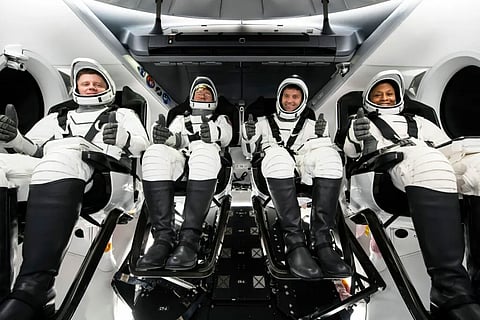

The United States’ National Aeronautics and Space Administration's (NASA) SpaceX Crew-8 mission, currently stationed at the International Space Station (ISS), is experiencing delays in its return to Earth due to severe weather in Florida’s splashdown zones. Consecutive hurricanes Helene and Milton have wreaked havoc across the state, bringing life-threatening conditions such as deadly storm surges, destructive hurricane-force winds and widespread flooding.
In March 2024, the mission transported four crew members to the ISS — NASA astronauts Matthew Dominick, Michael Barratt, Jeanette Epps and Roscosmos cosmonaut Alexander Grebenkin. Completing a seven-month science expedition aboard the orbiting laboratory, the crew will return important and time-sensitive research to Earth.
The mission is part of NASA’s Commercial Crew Program, which aims to transport astronauts to and from the ISS using commercial spacecraft.
The original plan was to undock Crew-8's Dragon capsule, Endeavour, on the night of October 7, 2024, but the unpredictable weather from Hurricane Milton forced a nearly week-long delay to ensure a safe return.
Hurricane Milton was a Category-5 tropical cyclone at its peak that formed in the Gulf of Mexico on October 5, 2024. Milton became the second-most intense Atlantic hurricane ever recorded in the region, rapidly intensifying from a category 1 hurricane (119 kilometres per hour or kmph to 153 kmph) to a category 5 hurricane (>253 kmph) in 12 hours on October 7.
The powerful storm churned up the seas in the splashdown zone, prompting NASA and SpaceX to wait for Milton to pass before approving Crew-8’s return to Earth.
Hurricane Helene arrived in Florida a fortnight before Milton. The hurricane’s near-record size, storm surge, winds and rainfall created a catastrophic disaster, extending over 500 miles inland from the Florida coast. The storm claimed over 230 lives across Florida, Georgia, South Carolina, North Carolina, Tennessee and Virginia, flooding towns, destroying infrastructure and sweeping away homes.
Weather forecasts are still uncertain for undocking on October 22 and 23. If conditions improve, NASA and SpaceX are aiming for no earlier than 6.35 am on October 23, 2024, to undock from the space station.
Meanwhile, astronauts Sunita Williams and Barry Wilmore, launched aboard Boeing’s Starliner in June 2024 for an eight-day mission, are still stranded on the ISS due to technical issues with Boeing’s Starliner spacecraft.
The Starliner had to return without its crew for safety reasons, extending their mission significantly. NASA and Boeing identified helium leaks and experienced issues with the spacecraft reaction control thrusters on June 6 as Starliner approached the space station.
Originally planned for ten days, Williams and Wilmore now expect to spend around 240 days in space, continuing their work aboard the ISS.